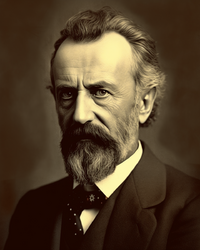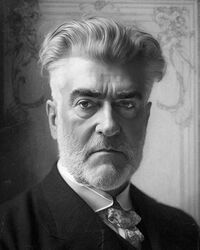Beranism
This article is incomplete because it is pending further input from participants, or it is a work-in-progress by one author. Please comment on this article's talk page to share your input, comments and questions. Note: To contribute to this article, you may need to seek help from the author(s) of this page. |
Beranism is an ontologically monistic moral philosophy which serves as the de facto state philosophy of the Prime Republic of Ostrozava. It originates from the works of early 20th-century Ostrozavan philosophers Vlastimil Beran and Julius Jahoda. Existing in relation to ideas derived from Wernerism, Beranism instead focuses on metaphysical issues such as free will, the nature of the Absolute, and the meaning of life, asserting idealistically that Wernerist materialism was incompatible with psychological discoveries about psychological needs and that to address class struggle is to use idealism and materialism in equal amounts. In writing, Beran referred to his work as aiming to find "global consensus on conceptions of class needs"; Beran and Jahoda both did not frame their philosophies as a formulation, but rather as a discovery of existing natural systems. Beranism is sometimes considered an theoretical development of the technocracy movement. Beranism is often compared and contrasted with Wernerism, the only other philosophical system mentioned in the Ostrozavan Social Contract after its revision in 1922. Beranist-Wernerist debate has turned vitriolic at time, and ardent Beranists were among the groups persecuted by the Dalibor regime; there still exists a rift in Ostrozavan political thought between Beranist idealism and Wernerist materialism, with idealism often occupying the fringes of intellectual and political thought within the Prime Republic, while materialism tends to find its supporters among the status quo.
Origins
The set of beliefs that would later come to be codified as Beranism came about in the late 1890s to early 1900s, after members of the Wernerist Transkarminian academic underground went on a "journey of discovery" across the world. Their initial goal was to develop ways to apply communalist methods of governance seen worldwide as an alternative to the pseudo-kleptocratic monarchy then in place in Transkarminia. Ostrozava and the broader Transkarminian region had long been cohabitated by the followers of diverse religious beliefs, primarily Nazarist in character for the previous several centuries; there had nevertheless also been massive influences from both the Fabrian and Lutheran Churches, Judaism, and both Ludic and Magnish Paganism.
Beranism was the result of syncretic and vigorous scientific and parapsychological examination of world religion and spirituality. Aiming to "mend the broken sense of meaning" caused by the dawn of Karminianism, Beran in particular rejected the materialist views of contemporary socialist and populist philosophers, insisting that phenomena such as intuition and consciousness disavowed said claims. For Jahoda, the focal point of interest became the native religions of Norumbia, particularly the belief in the Great Mystery seen in various peoples living throughout the plains of northern Norumbia, since, according to Beran, these religions had much in common with other religions' early forms. Beran, on the other hand, had become fascinated with the principles of the various enlightenment-based faiths of the Ozeros and Ochran, such as the Enyamo-Tsurushimese Furozin, Pulaui N'nhivara and the Dharmacakra faith of Ayvana. During their travels, the two also became involved in the Tsurushimese technocracy movement; Jahoda later successfully lobbied for the inclusion of Technocratic principles into the first drafts of the Social Contract. Beran is meanwhile widely considered to be one of the pioneers in the fields of comparative mythology and comparative religion, with his seminal work, The Universal Rhythm, continuing to influence philosophers and storytellers today. Upon returning to Karsko, various activists which had taken their own individual journeys abroad coalesed in the Three Forks Tavern (Ostrozavan: Hospoda Třividlice), where several intense philosophical discussions took place, attempting to outline commonalities observed between the individual members' observations about global religion, and the infant but revolutionary academic fields of psychology and quantum theory, specifically the observer effect, which Beran viewed as disproof of pure materialism that suggested the existence of what he deemed 'pure consciousness'. This eventually brought early Beranism back into some agreement with the !Hegalian roots of Wernerism, with the concepts of Pure Consciousness and Great Mystery being identified as the Geist.
Fascinated by the discussions, Beran and Jahoda saw that the other members of the Drinking Club, such as Vladan Vítek, had taken a more immediate interest in the emancipatory struggle, by 1900 already attempting to organize the 1st Worker's Convention, in the nascent beginnings of the Crimson Revolution. Seeing the infant movements beginning to take steam, but taking note that the vast majority of the Ostrozavan people had "split between fanaticism or cynical indifference", Beran and Jahoda began writing O Původu Boha (Ang: On the Origin of God), widely considered to be the central text of what became Beranism.
Beranism has had a profound impact on global academia, having influenced many fields, including archaeology, art history and theory, anthropology, media studies, science studies, political science, theater, history, sociology, cultural studies, education, economics, ethics, criminology, geography, literary criticism, film theory, psychology, and philosophy.
Development into political and ideological theory
Beranist thought has been alternatively suppressed or supported by the various apparatuses of the Ostrozavan state since its creation. As a de facto system of political thought, it never has been legally defined, leading to much controversy around it. The main core of Beranist thought today is known alternatively as Practical Beranism or Constructivist Beranism, and draws influence from Humanism, Pragmatism, Neowernerist Nanosocialism, and other utopian or pseudo-utopian ideals. Building on Beran and Jahoda's work, this system advocates for a society based around the understanding of three core axioms, as defined in 1963 by Practical Beranist scholar Ian Vamovik:
1. Dialectical Constructivism: Society is universally a reflection of the interaction of the Geist, the complex conscious needs of its members, with their material conditions and world. Material conditions and ideational constructs thus constantly inform each other and are interdependent; as a result, psychological needs must be fulfilled for the maintenence of the material and vice-versa. The goal of a society is not only to fulfill all material and psychological needs of its citizens to the best of its ability, but to empower each citizen as a capable actor in growing and maintaining its existence, eventually culminating in collective stewardship of the ideals of humanity.
2. Existential Responsibility: Nihilism is the biggest threat to society, and incompatible with the synthesis of the Geist with material reality. A continued embracing of nihlist ideals through a complete dogmatic adherence to a single identity, ideology, religion, or way of thinking leads to exploitation of intellect and labor, and threatens the continued existence of the human race. Every human being thus has a responsibility to avoid nihilism without replacing it with dogma. The preservation and growth of beauty, complexity, and consciousness must be ensured to protect against the exploitation, intolerance, and identitarianism brought by nihilism.
3. Techno-Ethical Progressivism: While some ideals may be unattainable now, there must be a constant striving for their achievement through the responsible and collective stewardship of technological growth as a vehicle towards the rejection of nihilism, and the construction of a truly equitable society. It is the striving itself that one must be inculcated to enjoy. As society progresses, it must ensure that the fruits of this growth are accessible to all of its members, facilitating not just a resolution of the material-ideational dialectic, but also a transcendence of it.
The initial form of Practical Beranism as defined in the late 1960s is typically associated with the initial iteration of the Progressive Party, and served as a counter-theory to the Ostrozavan variations of orthodox Wernerism practiced during the Second Compact administrations of Primars Emil Torje and Alek Dalibor (sometimes referred to as Daliborism in its last iteration); while later iterations of the Socialist Party in Ostrozava embraced some form of Beranism, adherence to the newest forms of the theory, such as neoreconstructivism remains within the purview of the Progressive Party's fringes, as well as serving as an anchor of the Interfront party founded in 2023.
In International Relations
Beranist international relations theory is entwined with the schools of critical theory, idealism, and social constructivism with some elements taken from neorealism, democratic peace theory, and world-systems theory. Beranist international relations theory acknowledges and expands on the basic premise of constructivism that while the world order is an anarchic state, an attitude of self-help between states is neither assured nor the most efficient form of power relations, and that the identities and interests of state actors determine their behavior on the world stage. Beranist international theorists criticize the inability of 20th century theories to adequately explain the persistence of authoritarian or quasi-authoritarian monarchies, and attempt to use psychological and sociological explanations to explain the lack of revolutionary development in some states. It also criticizes traditional Wernerist orthosocialism as inflexible and prone to the accumulation of power in either a central committee or the broader bureaucratic system.







